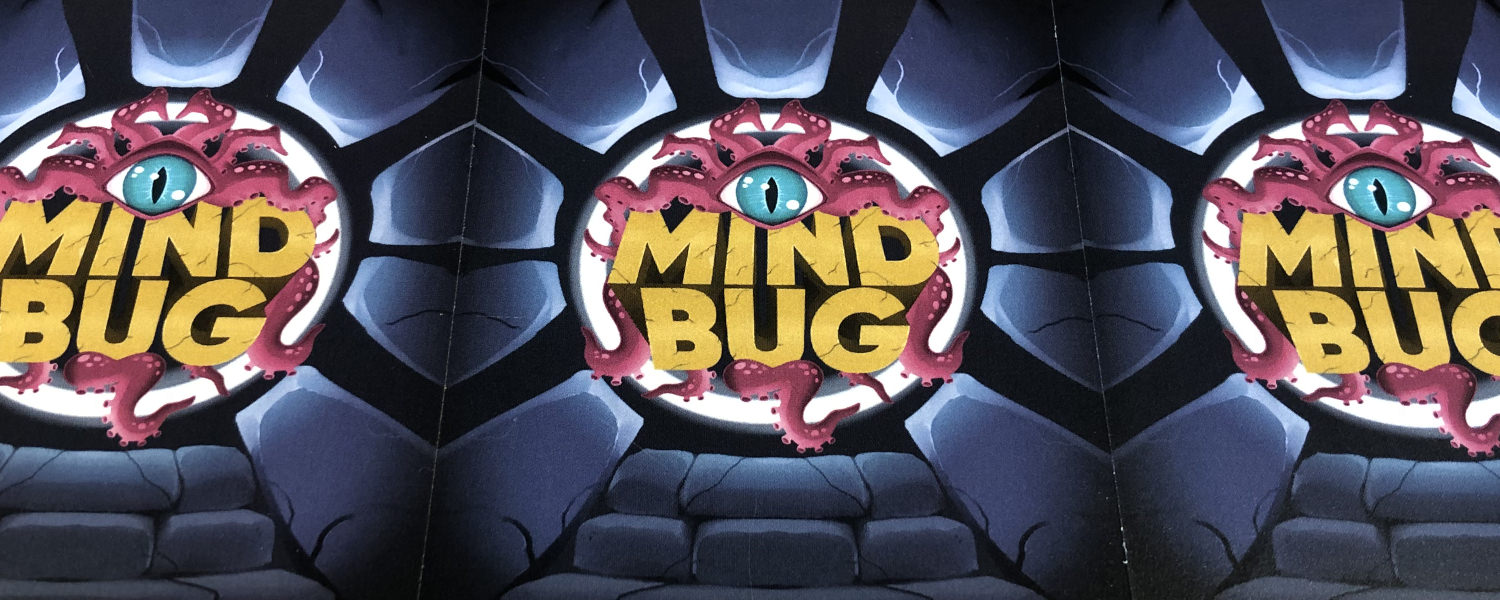
Mindbug - First Contact
Mindbug is a card game for two people that is currently being funded very successfully on Kickstarter. The object of the game is to steal three life points from your opponent. To do this, you send your Creatures onto the battlefield and let them compete against each other. If the opponent plays a too strong Creature, it can be used against him by a Mindbug. Since each player has only two of them, they should be used carefully. This sounds quite easy at first, but despite the short game duration and the scarce number of cards in the deck, Mindbug develops an enormous strategic depth. Shortly before the start of the Kickstarter campaign, I had the opportunity to talk to developer Marvin Hegen in detail about the project. You can read the transcript below, and you can find the podcast (german only - sorry) at e.g. Spotify or directly here:
I'm glad that it worked out so shortly before the Kickstarter and it would be great if you could introduce yourself.
Yes, of course. I'm Marvin and for about three years I've been working more intensively on the topic of game design. Three years ago I started my own podcast about it, the Nerdlab Podcast. I thought that what I have to learn now as a gamer who somehow has the desire and dream to become a game designer - that will surely interest others.
And that's why I tried to follow my process on the podcast and what I learned along the way, or what I thought about, or what advice I got from great designers who are much more experienced than I am, that's what I tried to share with my listeners. That was the beginning of the journey three years ago.
How did you get into board games in the first place, or games in general? Did you start playing again in the classic way or did you never stop?
Actually, I never really stopped - I actually played board games rather less in the meantime. That's where I actually came back to. What I have always played since my childhood are classic roleplaying games like Dungeons & Dragons and especially card games like Magic The Gathering ..... I came back to these classic boardgames only three years ago. But my primary interest has always been in these classic, very strategic card games.
What kind of board games do you play?
Those are the ones that also come from this classic card game direction, but then just have a little bit of something around it. That can be a dungeon crawler like Gloomheaven, which has some card mechanics to map the combat. But it can also be a deck building game like Aeons End. These are the kinds of games I like to play then, for example, with my circle of friends and then with the kids at home. At least what is then a bit more family friendly for the little ones.
How old are your kids?
They're 3, 5, and 7 now, and my five-year-old is really into it. But I also actually play Magic and all these card games with him. He's just very interested in them. And what we recently discovered is Zombie Kids. It's a legacy game for kids, which means that after they play a mission, they can upgrade their character. They can put stickers on them and have a progression with it. And the game changes over time. They're really into it, and all three of them like it.
Soon Mindbug will be launched as a Kickstarter. Maybe you can explain again what kind of game it is.
Mindbug is the first game I co-designed and the first game I'm publishing as part of the small publishing studio I founded. Mindbug is a card game. One of those typical strategic games that I like very much. But it has a unique twist, because it takes the classic card games like Magic, Keyforge or Hearthstone from the internet as a model, but makes everything a bit easier. With a lower barrier to entry, so you can play it with people who might otherwise come from more of a BoardGame direction.
We tried to simplify some things, but that core essence of the game, that strategic depth, so to speak, that combination of cards, that thinking about in what order do I play my cards? That's what we've tried to preserve. You play it one on one, but now there's also a two on two mode. The goal is to trick your opponent to get a better position on the board than your opponent. You have to work for it little by little. In the end, you win if you have used your Creatures and Mindbugs better than your opponent. These are the core idea of the whole game.
It's based on the fact that each player has two of these Mindbugs, and they allow you to take over when your opponent plays a Creature. So you can control the mind of that Creature and that makes it interesting all the time because you have to think, what is this Creature worth to me now if I play it out, but you always have to keep in mind, what would it be worth to my opponent if he steals it from me now?
And so the game has a little bit of a bluffing element to it, because you have to offer your opponent a few things. If you manage to maneuver him into a situation where he has to use his Mindbugs in places that might not be so good for him, then you gradually gain an advantage on the board and at the end of the game.
How did you get the idea to develop a game yourself?
It started relatively early, and I think a lot of people feel that way. When you play role-playing games and you are the dungeon master, you create worlds as a player, you create characters and play them. This creating something has always excited me. Ever since I was a kid, whether it was coming up with adventures, whether it was creating characters, whether it was starting a business. All this creating something out of nothing. That has always excited me and to combine that with a topic that excites me, namely games, that was actually the next logical step.
Then at some point I thought to myself, okay, now you're getting serious. And so that you don't lose interest after two weeks, you start this podcast and tell the whole world about it. Then people can keep an eye on you and reprimand you if you haven't recorded a podcast or given an update for a few weeks. So I built up a little bit of pressure in the background, which helped to push the project forward.
How did the collaboration with Richard Garfield and Skaff Elias come about?
As part of the podcast, a community of like-minded people has also formed. I've always had the feeling that if I have a question and I post it publicly in a group like a Facebook group or some forum, then I get answers, a lot of answers, but the quality of these answers is very superficial. So there I can put in pictures of illustrators and ask is one or two better, but you usually don't find anyone who can spend half an hour with your game and then give you a deeper answer. That was the core and at that time I asked myself how can you somehow do that better? Then I created different mastermind groups so that my listeners could get together in smaller groups of five or six people who also met regularly. Just an hour every two weeks or an hour every week to talk about their own games.
This allowed everyone to get to know the game a little better and give more in-depth feedback. Then, as part of a mastermind group, I met my co-designer Christian Kudahl. He's actually been a listener of my podcast and we realized relatively quickly that we're into the same kind of games. I'm very into strategic depth, like complex games and Christian is someone who likes to bring in a certain simplicity. This combination describes very accurately what Mindbug actually is, namely the strategic depth together with the simplicity - we then realized that this fits well together. Then we developed the rough idea and a prototype. We played it and developed it further and further. We worked on it for half a year or maybe longer. I don't remember exactly.
At some point I invited Richard Garfield, the inventor of Magic, to be a guest on my podcast, because I've always invited a lot of experienced game designers I know to learn from him and get advice from them. And I just presented him this idea of the game. He found it interesting. We played a round and his first sentence was: I'm very impressed - can we play again? So I'm very impressed. Can we play another round? So we played a few more rounds and then it didn't take long at all and we agreed relatively quickly how we wanted to work together. Richard Garfield often works together with Skaff Elias. They've known each other forever. That's also one of the guys who's been with Magic since day one. Since then we've been working together, meeting weekly and designing diligently on Mindbug.
How long have you been developing the game now and does Corona have any influence on your work?
We are a completely distributed team. I don't think it would have been much different without Corona. Christian is from Denmark, I'm from Germany and Skaff and Richard are from the United States, so we probably would have done everything digitally anyway. So the Corona time didn't bother us much at all, but you asked how long it's been now. I would say it's been pretty much 2 years that we've been developing the game.
Marketing-wise, you wrote to a lot of bloggers and gamers on social media before the Kickstarter campaign. Was that the plan?
Well, that's actually, I say from the back of the head and completely different from what anyone else is doing. You can say it's ignorance from someone who is doing it for the first time, but for us this strategy has worked out pretty well - until now. Normally you do the Kickstarter and then go to a trade show or retail. For us, Spiel 2021 at Essen was a date when, after the long Corona time, many players finally get together again, the press comes there and it was the opportunity for us to get attention - at least that's how we interpreted it. That's why we wanted to have something for the trade fair in any case and set ourselves that as a deadline, so to speak, and then developed explicitly for it. A few days before the fair we got our first print run from Mindbug. After two years of work we just couldn't wait to finally show it to the people and get the feedback. For after that, we didn't have a very specific plan on how to proceed. That we wanted to do the Kickstarter, that was already planned. But the fact that it's actually starting now, four weeks after the trade fair, is really a huge effort to be able to pull it off.
Launching a Kickstarter campaign is certainly very time-consuming, right?
I can absolutely confirm that, if you think about how many people work on such a project. It's a small card game now and I'm sure there are 25 people working on it. Coordinating everything and planning somewhere and making sure that everything is there on time, as you need it, that's a huge effort that you don't even see at the end when you hold the game in your hand.
Was Mindbug always planned as a pure card game, or should there also be tokens in another form?
It was intended as a card game from the beginning. We had set a design target at the beginning that we would only use cards. But that doesn't mean that we didn't think about doing something else about 250,000 times during the process, and we still do. The game lends itself very well to doing something with tokens as well. Whether we will do that, I don't know exactly yet, but it's definitely something that we always have in the back of our minds and where we're also thinking about maybe doing something again later.
But because you brought it up with the components and the cards. It's a huge advantage for us that we only have cards. We wouldn't have had a product at Spiel 2021 at Essen if we had had several components. Then we would have been without because the production possibilities for games are an absolute disaster right now. As soon as you need solid packaging or as soon as you need something in offset printing, you have delivery times or production times of six months. We then had the chance, since we only had cards, to print the whole thing digitally. The margin is worse, but that was okay for us because we really wanted to show people something.
Then you could probably have that printed in Germany now?
Yes, it is now printed in Germany. Anyone who was at the Spiel 2021 saw that many people actually had to show up without their games. This is simply due to the fact that the global logistics market is going completely crazy at the moment. Many of the games are normally produced in China and it simply took forever to get here and then some of them didn't arrive on time.
Many are now saying, I can't get my things from China at the moment, so I'm producing in Europe. As a result, the factories here are all overloaded and that leads to a situation where it is difficult to produce things on time on the market. I am quite happy that we have gone this way, because it at least allows us the option to act faster.
Have you guys considered that for the Kickstarter campaign production capacity abroad? I can imagine that it's really difficult to decide at the moment.
Well, it's extremely difficult for me, too. We must have talked to ten factories worldwide, in Europe, in China, in Germany, and we didn't make the decision easily. There are so many factors, from production costs to delivery times and sustainability. You kind of think about all of that. And the current status can certainly change during or after the campaign. Not everything is fixed yet, but we actually decided to do it again in the same way as we did for the trade show and to be able to get the game out to people as quickly as possible. That's a little bit related to the fact that we have a small print run for the game already on the market. So there are people who already have it and can play it and it's really well received. Because of that, there's a huge amount of interest and there's not a day that goes by where ten people ask me when the game is coming out. We want to take advantage of that momentum and deliver what the players want from us.
Of course, we also got comments like your box could be a bit better, it could be a bit more stable, it could be a bit bigger. That's what we have to address now. We probably won't be able to do the Ultra Deluxe box now, because those are mainly produced in China. If we did that, people would wait at least four to six months longer for their games. So we've decided to go with time-to-market for now.
At the moment, something is happening in the production of board games. With container prices, hardly anyone can afford a large box with 50% air inside. Kosmos has now brought out the Red Cathedral - a big game with a small box. That's perfectly fine for card games, too.
Yes, from the sewing box: the container prices have increased fivefold within one year.
This is really insane. Five days left until the Kickstarter campaign starts?
Right, do you have to rub my nose in it? ;-)
How long does the whole campaign run?
The campaign runs for 18 days. We didn't want to make the campaign so long for various reasons. For one thing, we're doing it on the side, which means we simply don't have an infinite amount of time that we can cut out of our normal lives. On the other hand, we don't want to get right into the Christmas business. We'd rather have it focused and maybe continue with a LatePledge afterwards.
When have you approximately targeted delivery?
The decisions are not final yet, but the middle of next year would be my target, where I would like to deliver at the latest. Maybe we'll be faster if everything works out the way I envision.
Then back to the game itself - are there things like designs that have been incorporated from the community?
Very good question. When you say designs, do you mean the illustration, or do you mean how the cards work in principle?
Both. The visual design, but also the functionality of the cards - the mechanical design, so to speak.
The mechanics all come from the game designers. That is, Christian Kudahl, Richard Garfield, Skaff Elias and myself. We meet once a week and develop the game mechanics, create individual cards and then test those. We then continue the whole thing in a larger group with more PlayTesters, i.e. with other players and friends and acquaintances, but also in any game design communities and events.
The rest is more the responsibility of the publisher. In this case, it's my company Nerdlab Games. That means I'm a game developer and publisher at the same time. That means this whole world, the characters, I came up with them and tried to describe them. The result was a relatively bad description, because I'm not that good at it. But luckily I have a world-class illustrator, Denis Martynets, who turned my bad descriptions into these incredibly good illustrations. We really got a lot of positive feedback on that. He really brought the whole thing to life and also incorporates a lot of his own ideas. In the beginning we had some revisions when we did something, but now I know that what he does is good and I give him a description and then I give him a free hand for the most part. In between there is sometimes a small change, but there is already very much from him.
After that, the whole thing goes to our graphic designer. That's Maximilian Gotthold, he's also super good and we couldn't have done it without him. He then sets the texts, makes the frame and creates all kinds of graphics that we need, for example for the website and for the Kickstarter page. At the moment we work together for hours every day. Then we have a big project team around it. There are really a lot of people involved now, who are building this world bit by bit, who are trying to build up the humor and then transfer that into social media posts or also into little stories. That means there's a lot more to come in the future.
That's the core team that we're putting together from our side, and now briefly to your second question: has there been anything from the community yet? We really presented it for the first time in Essen. That means there's not really much in it from the community yet, except for the feedback we got at PlayTests. But I personally think the Kickstarter campaign is a huge opportunity for that now. That's a big essential part of the campaign, that we take the community with us. The community will have the chance to design their own Creatures, influence the illustrations, influence the names and also the cards themselves. I think we'll develop something together with the community that will be really good.
How long does it take to balance a character to the point where they can be in the game?
It varies a lot, so Mindbug in itself as a game has the bonus of actually having an auto balancing mechanic - I always call that. Richard Garfield disagrees, but so was my pitch at the time - that's what got him interested. I think the Mindbugs balance the game to a large extent. That is, even if you have a card that says I win, the strongest card imaginable, I don't think even that card would ruin the game. If you play the card, the opponent steals it and wins the game. That means you can't actually play it from the beginning because then you lose. In that respect, you would still have to make a very, very tactical play beforehand to elicit the opponent's Mindbugs in order to then win the game. That wouldn't be the nicest ending you could want for such a game, but it can still be a very good very exciting round beforehand.
This shows how strongly this mechanic helps us balance the cards. That means in our game, all the cards are actually very, very strong. So we have less trouble balancing cards that are somehow too strong. We've had more problems with cards that are either too weak or boring, or cards that cause problems rules-wise. That's something we spend a lot more time on. That means that when we have a card that can interact with other cards in some way, we have two experts, Skaff and Christian, who are extremely passionate about thinking everything through to the smallest detail, building huge Excel spreadsheets, and looking at how the card might affect the cards we already have, or future cards we might want to design. The process actually takes a relatively long time.
That means, to develop such a map, to think about it is actually relatively fast, you can also quickly become creative. But then to fit it in exactly so that it fits the power level, so that it's interesting and fun - that's the task. And above all, to make sure that it works with the rules and with everyone else - that's the biggest challenge, depending on how focused you are. So we now meet once a week and then maybe test in between during the week. Now if you get together for five days at a time, then of course you have a completely different time span. The cards that are now in the current print run have been tested and refined over the course of two years. There are bound to be one or two cards in the set that were created in the four weeks before Spiel 2021 at Essen. So you can also get it done faster.
You've definitely had a few games of Mindbug under your belt.
That for sure.
I'm so far through with my questions. Is there anything else you want to say?
I can only suggest to everyone who is somehow interested in this hobby and wants to get deeper into it and develop their own games: just give it a try. Sit down, write down your ideas, put them on paper, make a prototype as soon as possible and no matter how bad it is, play it with your friends, with your kids, with your family and see what develops out of it.
Then I thank you very much for the interview and I wish you very, very much success with the Kickstarter campaign, although I have no doubt that it will be very successful.
Yes, for now I'm mainly doubtful that we'll be done by November 23rd, we'll have a few more hours of work.
Okay, then I'll definitely keep my fingers crossed that it works out. Thank you!
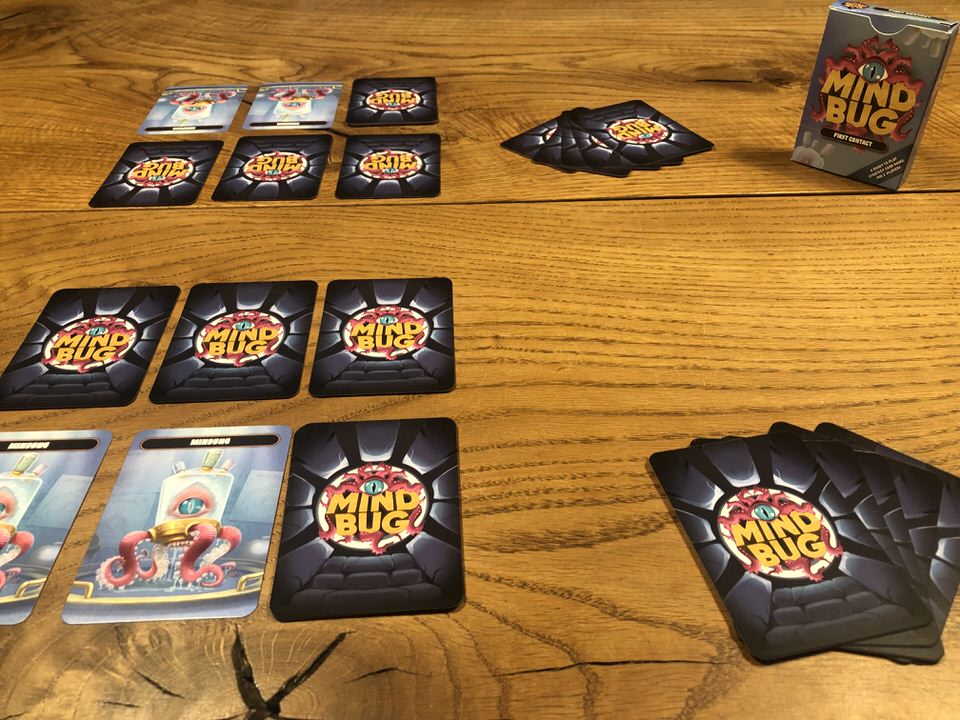
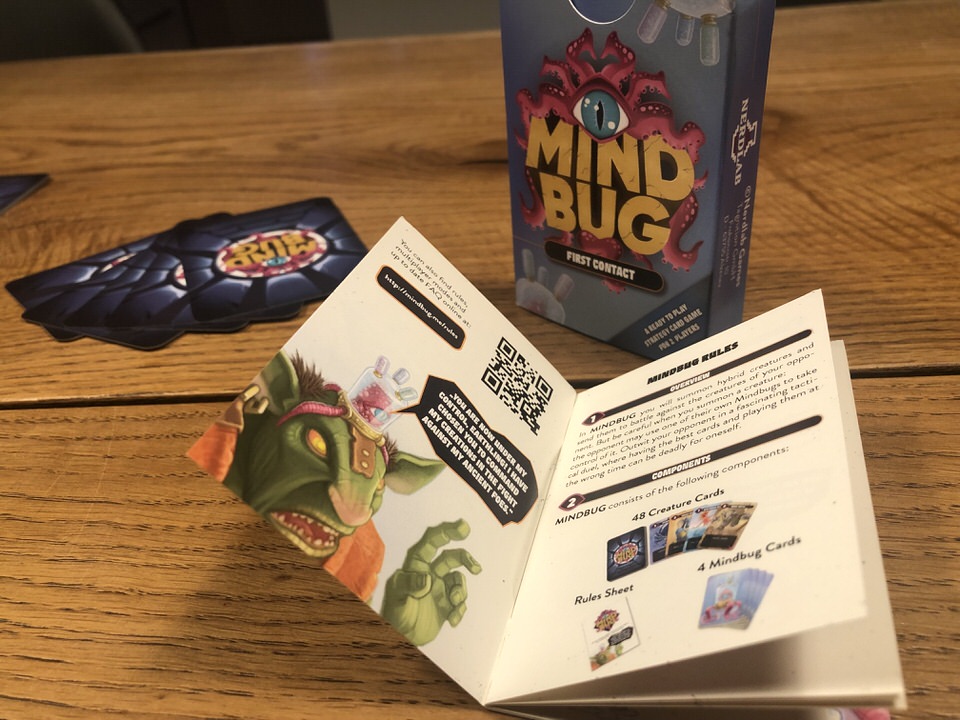
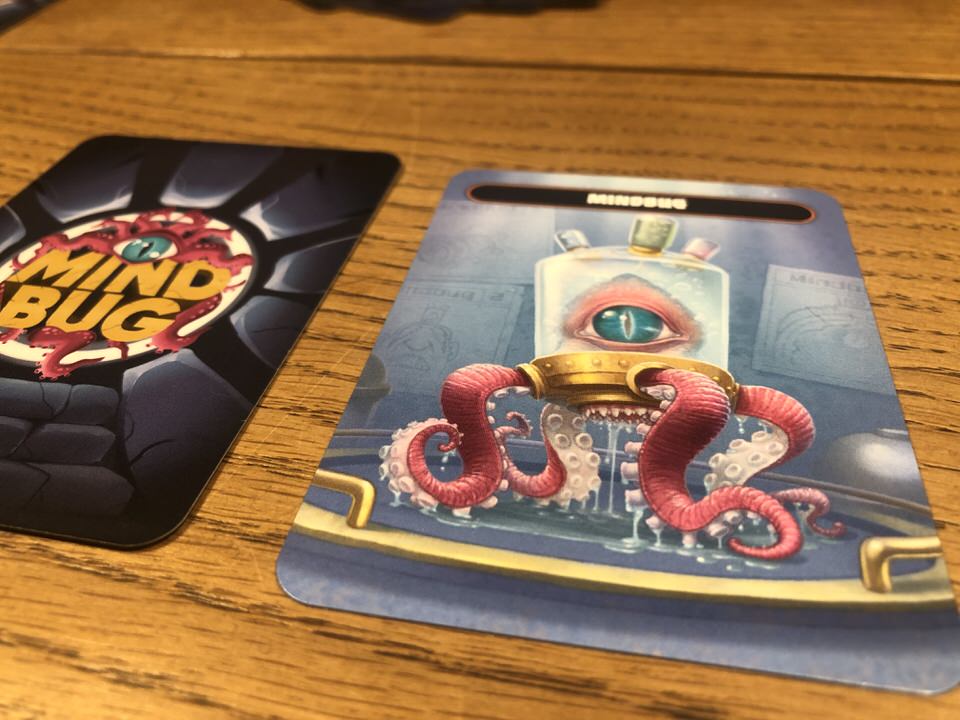
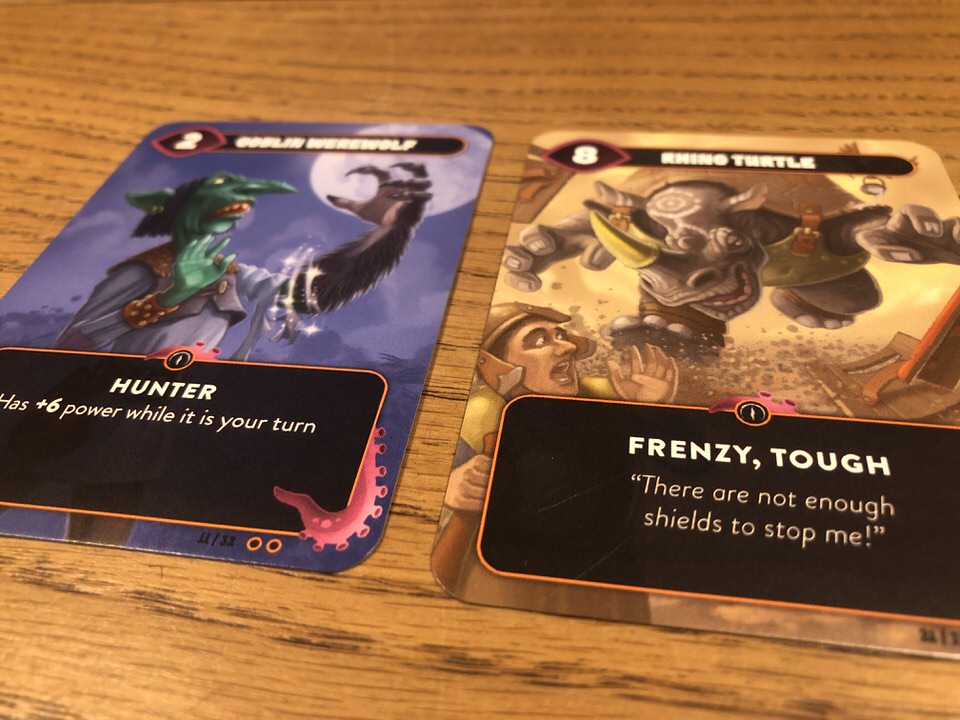
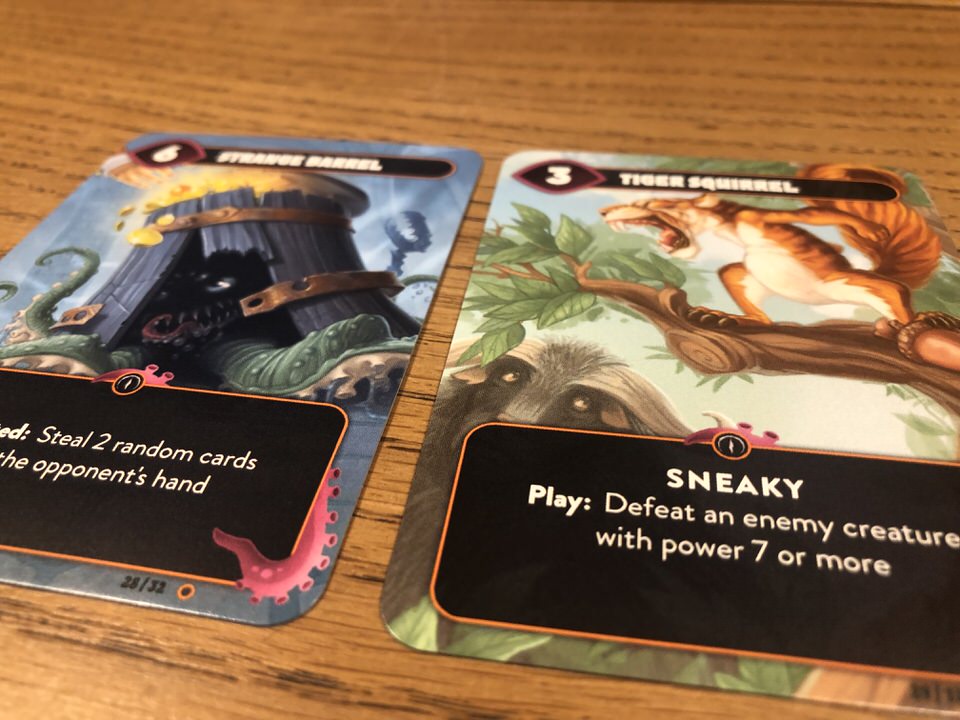
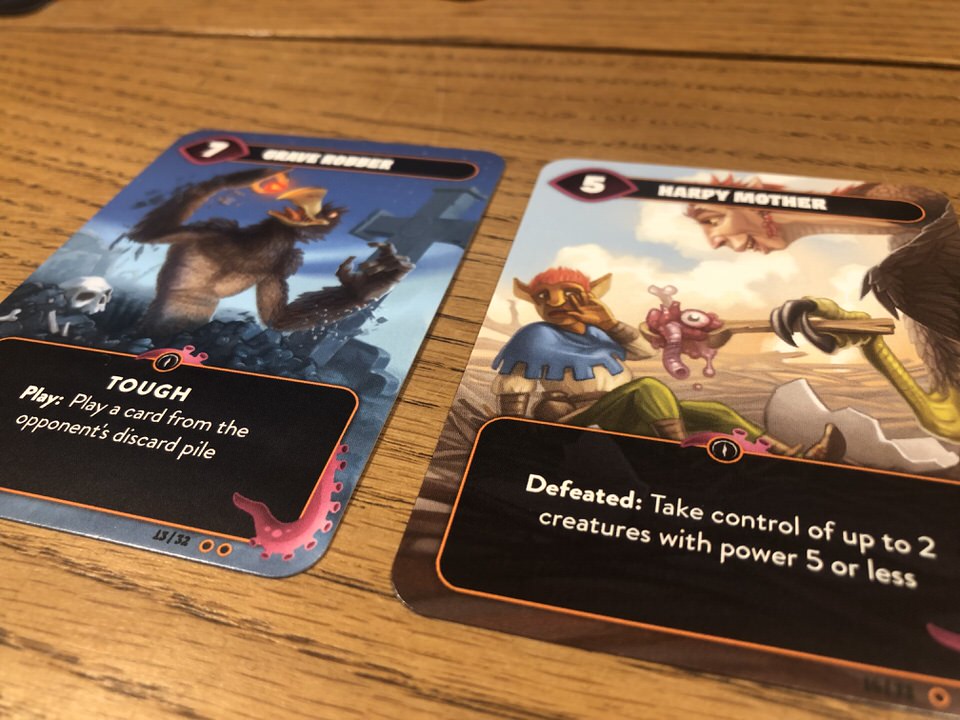
Leave a comment